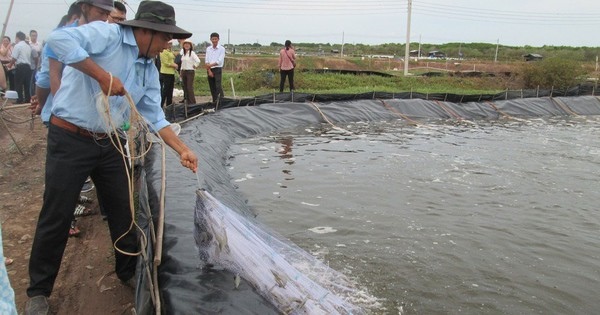Information from the Bureau of Industry and Security (Department of Commerce) in late November 2023 indicated that the Department of Commerce (DOC) initiated an anti-subsidy investigation regarding warm-water frozen shrimp imported from certain countries, including Vietnam. The investigated products are warm-water frozen shrimp with HS codes 0306.17, 1605.21, and 1605.29. The subsidy investigation period is 2022, and the investigation of injury is from 2020 to the first half of 2023.
Subsidy Investigation
According to the DOC, since fresh raw shrimp accounts for a large proportion, up to 95% of the value of warm-water frozen shrimp, subsidies provided to fresh shrimp suppliers in Vietnam are considered subsidies for frozen shrimp producers and exporters. The DOC has selected two Vietnamese companies as mandatory respondents and requested these companies to provide explanations in accordance with the agency’s requirements.
According to data from the Vietnam Association of Seafood Exporters and Producers (VASEP), in 2022, Vietnam exported around 800 million USD of the accused products to the U.S., accounting for about 20% of the total shrimp market share exported to the country.
In relation to this issue, VASEP recently sent a letter to the Prime Minister, the Ministry of Industry and Trade, the Ministry of Agriculture and Rural Development, requesting active support in the U.S. anti-subsidy investigation against the Vietnamese shrimp industry to help the industry overcome the investigation stages in the coming time.
 Harvesting shrimp in Soc Trang – Photo: NGOC ANH |
Deputy Prime Minister Le Minh Khai subsequently requested the Ministry of Industry and Trade to coordinate with relevant agencies to consider and decide on the use of legal consulting services and support Vietnam’s Government in the U.S. anti-subsidy investigation against warm-water frozen shrimp to actively support the shrimp industry.
To best protect the rights and interests of Vietnamese exporters, the Bureau of Industry and Security recommends that associations notify exporting companies subject to the investigation, proactively study and develop response plans to handle the case. For related production and export companies, the Bureau of Industry and Security suggests reviewing the received support programs and policies (if any) during the investigation period and prepare relevant documents and records. “Companies need to proactively study, understand the regulations and procedures of the U.S. anti-subsidy investigation, the information requirements of the DOC, to comply correctly in the event of participation in the case. Along with that, prepare resources for handling the incident,” said a representative of the Bureau of Industry and Security.
Before the DOC initiated an anti-subsidy investigation against warm-water frozen shrimp imported from Vietnam and some other countries, lawyer Nguyen Thanh Ha (Hanoi Bar Association) believes that the need to protect domestic production of countries is increasing, so the number of trade defense measures applied by investigating countries is also increasing. When involved in a specific case, exporting companies must contact lawyers in the host country for consultation, with relatively high costs, as well as costs for pursuing lawsuits, so companies need to carefully consider. In addition, companies need to proactively coordinate and collaborate with other companies exporting the same products to plan common responses. At the same time, coordinate with agencies of the Ministry of Industry and Trade, including the Bureau of Industry and Security, to receive guidance and necessary information.
Promoting Processing, Reducing Costs
According to VASEP, Vietnam’s shrimp exports in 2023 reached an export value of 3.4 billion USD, a decrease of 22% compared to 2022. In 2024, despite facing many challenges, including the U.S. anti-subsidy investigation against warm-water frozen shrimp, VASEP forecasts that the export value of the industry can reach around 4 billion USD with solutions such as promoting value-added processing and focusing more on the farming stage to reduce costs.
Specifically, Vietnam’s value-added processed shrimp products currently account for 40% to 45% of the total annual shrimp export value. The processing level of Vietnamese companies is high compared to the world average, making it a significant competitive advantage. Prominent value-added shrimp products of Vietnam include: breaded shrimp, fried shrimp, seasoned shrimp, butterflied shrimp, skewered shrimp, shrimp dumplings, ginger shrimp dumplings, frozen breaded butterfly tail-on shrimp, frozen skewered tail-on shrimp…
According to Ho Quoc Luc, Chairman of the Management Board of Sao Ta Food Joint Stock Company, after receiving information that the U.S. initiated an anti-subsidy investigation against Vietnamese shrimp, companies restricted the export of two investigated items to avoid being affected and shifted to heavily processed items such as breaded shrimp, fried shrimp… Luc also stated that apart from Vietnam, the U.S. is also investigating Ecuador, India, and Indonesia, the three major shrimp exporters, under similar investigations. Therefore, in terms of competition, Vietnamese shrimp does not face significant disadvantages in the U.S. market.
Tran Van Linh, Chairman of the Management Board of Thuan Phuoc Seafood and Trading Company, also has a similar perspective on shrimp exports to the U.S. in 2024. However, Linh’s concern is that if cheap shrimp from Ecuador cannot be exported to the U.S., it will redirect its “attack” towards the European and Japanese markets, affecting Vietnam’s market share. “This year, the shrimp industry continues to face difficulties. Since the beginning of the year, companies have incurred losses from pre-signed contracts due to sudden increases in shipping charges,” Linh expressed concern.
|
The Case May be Terminated According to the Bureau of Industry and Security, the final determination of the anti-subsidy investigation is expected to be announced on May 17, 2024. However, the U.S. will only issue a tariff order against Vietnam if the DOC determines the existence of subsidies and the U.S. International Trade Commission determines that the domestic U.S. industry suffers injury caused by subsidized imported goods. If either party determines that there is no subsidy or injury, the case will be terminated. |
MINH CHIEN – VUONG NGOC












